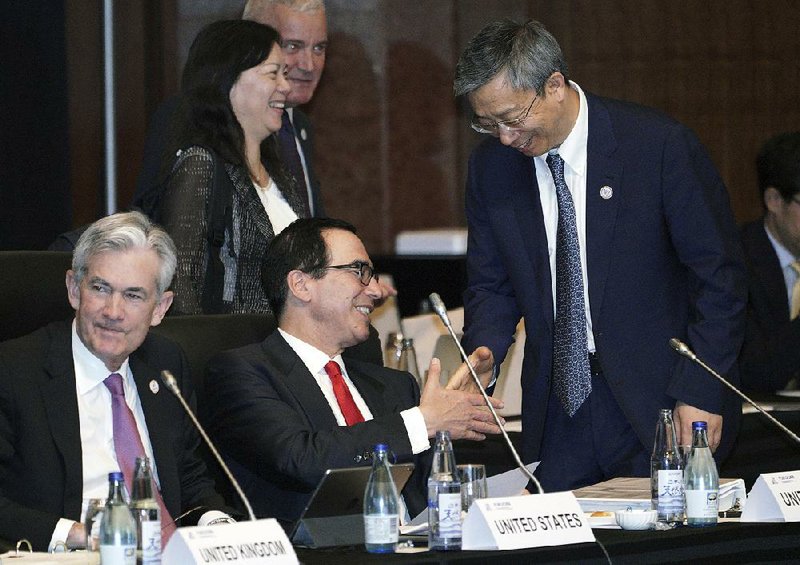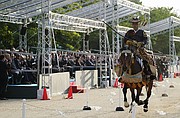FUKUOKA, Japan -- A day after President Donald Trump called off plans to impose a 5% tariff on Mexican goods, Treasury Secretary Steve Mnuchin urged China to return to stalled trade negotiations.
After three days of talks, the U.S. and Mexican governments announced Friday night that they had reached a deal in which the White House would hold off on its threat to impose escalating tariffs on Mexican goods and Mexico agreed to implement "strong measures" to slow the entry of Central Americans into the United States.
Mnuchin, speaking to reporters Saturday in Fukuoka on the sidelines of a meeting of financial leaders of the Group of 20 major economies, said he planned to have a private conversation with the head of China's central bank, Yi Gang. In a G-20 group meeting later in the day, the two were seen exchanging friendly remarks, but there were no fresh signs Beijing is ready to compromise in the dispute over trade and technology.
"From our perspective of where we are now, it is a result of them backtracking on significant commitments," Mnuchin said. "I don't think it's a breakdown in trust or good or bad faith. ... If they want to come back and complete the deal on the terms we were negotiating, that would be great."
Mnuchin said he had no direct message to give to Yi, who has participated in the 11 rounds of talks so far on resolving the dispute between the world's two largest economies over technology and trade.
Mnuchin said there were no plans for trade talks in Washington or Beijing before Presidents Donald Trump and Xi Jinping are to meet in Osaka for the G-20 summit on June 28-29.
"This will be a one-on-one with Gov. Yi to talk alone about the trade issues," Mnuchin said. But he added, "I would expect the main progress will be at the G-20 meetings of the presidents."
The treasury secretary said his meeting with Yi was not part of trade negotiations, but he acknowledged that the subject would come up. He said the meeting would have two parts: one focused on general macroeconomic issues, such as currencies, and a separate discussion about trade.
Yi said in an interview Friday with Bloomberg News that the discussion of trade with Mnuchin would be "uncertain and difficult," and he insisted that China could withstand a prolonged trade fight with the United States.
TRADE, FRUSTRATION
The Trump administration began imposing tariffs on imports of Chinese goods nearly a year ago, accusing Beijing of using predatory means to lend Chinese companies an edge in advanced technologies such as artificial intelligence, robotics and electric vehicles. Those tactics, the U.S. contends, include hacking into U.S. companies' computers to steal trade secrets, forcing foreign companies to hand over sensitive technology in exchange for access to the Chinese market and unfairly subsidizing Chinese tech firms.
The deal with Mexico helps alleviate uncertainty over the deal Washington recently reached on revising the North American Free Trade Agreement. The new U.S.-Mexico-Canada deal has been heading toward a vote in Congress and might have been stymied by new tariffs. But the U.S. is still negotiating new trade deals with Japan after withdrawing from a Pacific Rim arrangement, the Trans-Pacific Partnership that was proposed during President Barack Obama's administration.
America's huge trade deficit with China -- a record $379 billion last year -- is one factor driving Trump's frustrations with Beijing.
The United States now is imposing 25% taxes on $250 billion in Chinese goods. Beijing has counterpunched by targeting $110 billion worth of American products, focusing on farm goods such as soybeans.
The U.S. side has been preparing to expand retaliatory tariff increases of 25% on another $300 billion of Chinese products, and Mnuchin indicated it was prepared to take that step if negotiations with Beijing fail. But he said Trump had not yet made a decision on that, suggesting room for further delays depending on the outcome of his discussion with Xi later this month.
"As the president has said, if we can get the right agreement, that's great. If we can't, we will proceed with tariffs," he said.
Asked about China's currency, Mnuchin attributed its recent decline to market forces and the absence of intervention. "When you have intervention in a market for a long period of time and then they don't intervene, the market could view that as a desire to have the currency weaken," he said.
The Treasury Department issued its semiannual foreign-exchange report to Congress last week, in which no country was named as a manipulator. China remains on its watch-list.
While the trade war has unnerved investors, U.S. economic growth has continued. The unemployment rate is the lowest since 1969 and so far inflation data show that consumers haven't felt pressure from rising prices.
"People talk about the economic risk of trade wars," however "they should be even more focused on the benefits of having a great trade agreement," Mnuchin said, noting that there's no evidence of the U.S. economy taking a hit from tariffs.
"If anything I would say as a result of tariffs on China there are a lot of companies that are moving that production to other countries that I think will be a big boom for those economies, there will be winners and losers, there are clearly countries that will be big beneficiaries on movement" of production, he said.
Not everyone is as sanguine about the economic impact of the trade tensions.
In separate comments last week, Fed Chairman Jerome Powell and Vice Chairman Richard Clarida reassured nervous investors that they are watching closely for signs that disputes between the U.S. and its trading partners are denting the outlook for the world's largest economy.
DIFFERING VIEWS
Democrats on Saturday denounced the White House's deal with Mexico to stem the entry of migrants into the United States as an example of the president fixing a crisis of his own making.
"President Trump undermined America's preeminent leadership role in the world by recklessly threatening to impose tariffs on our close friend and neighbor to the south," House Speaker Nancy Pelosi, D-Calif., said in a statement. "Threats and temper tantrums are no way to negotiate foreign policy."
Republicans, meanwhile, praised the deal and expressed relief that the president wouldn't resort to across-the-board tariffs on one of the country's top trade partners. Sen. Marco Rubio, R-Fla., said in a statement that while he did not support imposing tariffs on Mexico, he commended Trump's "exerting maximum pressure and demanding decisive action" from the Mexican government on immigration issues.
Several of Trump's would-be 2020 Democratic challengers condemned the deal and how it was reached.
"The damage of Trump's reckless trade policies and tariffs has already been done," former Rep. Beto O'Rourke of Texas said on Twitter. "What we see is yet another example of him trying to be both the arsonist who created this problem in the first place and the firefighter who wants credit for addressing it."
Pete Buttigieg said the president's deal amounted to a "face saving maneuver" for a negotiating tactic that wasn't working.
"We need a comprehensive strategy, not just a pattern of poking folks in the eye," Buttigieg, the mayor of South Bend, Ind., said. "It was clear the administration itself had really not thought this through. They just went to the brink, frightened the markets, got a superficial concession, and then went back right back to where we were. This is no way to manage our trade policy or our immigration policy."
Information for this article was contributed by Elaine Kurtenbach of The Associated Press; by Alan Rappeport of The New York Times; by Saleha Mohsin of Bloomberg News; and by Colby Itkowitz and David Weigel of The Washington Post.
A Section on 06/09/2019

